| Article ID | Journal | Published Year | Pages | File Type |
|---|---|---|---|---|
| 3360438 | International Journal of Antimicrobial Agents | 2008 | 6 Pages |
This study evaluated the antituberculous potential of 2-nitroimidazole under in vitro conditions. Minimal bactericidal concentrations of the compound against actively replicating Mycobacterium bovis BCG and Mycobacterium tuberculosis H37Ra were found to be 0.226 μg/mL and 0.556 μg/mL in enriched and minimal medium, respectively. Minimal inhibitory concentrations were >100 times lower than reported antituberculous nitroimidazoles such as nitrofurantoin and furaltadone, indicating the greater potential of 2-nitroimidazole. No discernible effect of 2-nitroimidazole was seen on saprophytic Mycobacterium smegmatis and the representative bacterial strain Escherichia coli DH5α, indicating the specificity of the molecule against tuberculous mycobacteria. The compound was also found to be effective against M. tuberculosis in the intracellular environment of the human monocytic cell line THP-1, with a reduction in viability of bacilli by 2.5 log after 144 h of incubation at a concentration of 0.113 μg/mL. A five-fold higher concentration (0.565 μg/mL) of 2-nitroimidazole sterilised the macrophages of intracellular pathogens within 192 h, without affecting the host. However, 2-nitroimidazole was unable to affect significantly the viability of dormant non-replicating bacilli of M. bovis BCG and M. tuberculosis in Wayne's in vitro model. Overall, the results indicate that 2-nitroimidazole is a potent antituberculous agent active against the organism's active replicating stage, with promising intracellular efficacy as well.
